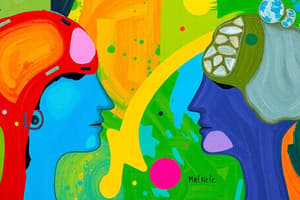Podcast
Questions and Answers
What primarily defines stress according to its concept?
What primarily defines stress according to its concept?
- It is a permanent condition affecting job performance.
- It is an individual's response to any stimulus.
- It is an adaptive reaction to excessive psychological or physical demands. (correct)
- It is solely a reaction to physical demands.
Which of the following best describes stressors?
Which of the following best describes stressors?
- Only personal factors affecting individual health.
- Elements exclusively arising from work scenarios.
- Factors that can originate from various situations and influence multiple aspects of life. (correct)
- Stimuli that impose no influence on job performance.
What must a person perceive for stress to be experienced?
What must a person perceive for stress to be experienced?
- The absence of any external pressure.
- The demands as manageable and routine.
- Stress as a normal part of life.
- The demands as excessive. (correct)
In discussing stress, which aspect is NOT typically associated with its effect?
In discussing stress, which aspect is NOT typically associated with its effect?
What is a key factor in determining if an individual feels stress?
What is a key factor in determining if an individual feels stress?
What characterizes a Type A personality?
What characterizes a Type A personality?
Which of the following statements about Type B personality is true?
Which of the following statements about Type B personality is true?
In comparing Type A and Type B personalities, which misconception is commonly held?
In comparing Type A and Type B personalities, which misconception is commonly held?
What is a key distinction in the work habits of Type A and Type B personalities?
What is a key distinction in the work habits of Type A and Type B personalities?
Is it correct to categorize people as purely Type A or Type B?
Is it correct to categorize people as purely Type A or Type B?
Which of the following is NOT considered an organizational stressor?
Which of the following is NOT considered an organizational stressor?
What consequence is associated with destructive stress?
What consequence is associated with destructive stress?
Which of the following is categorized under individual consequences of stress?
Which of the following is categorized under individual consequences of stress?
Which type of demand is characterized by ambiguity and conflict?
Which type of demand is characterized by ambiguity and conflict?
What type of life stressor is associated with significant changes in a person's life?
What type of life stressor is associated with significant changes in a person's life?
Which of the following correctly lists a consequence of stress?
Which of the following correctly lists a consequence of stress?
Which aspect of stress is considered to be constructive?
Which aspect of stress is considered to be constructive?
What is the primary focus of interpersonal demands as stressors?
What is the primary focus of interpersonal demands as stressors?
What is a consequence of individual stressors related to role demands?
What is a consequence of individual stressors related to role demands?
Which individual coping strategy involves preventing overload and conflict?
Which individual coping strategy involves preventing overload and conflict?
Which physical demand stressor could lead to medical consequences such as heart disease?
Which physical demand stressor could lead to medical consequences such as heart disease?
What psychological issue can be a consequence of chronic stress?
What psychological issue can be a consequence of chronic stress?
What is the primary focus of relaxation as an individual coping strategy?
What is the primary focus of relaxation as an individual coping strategy?
How can time management alleviate daily pressures?
How can time management alleviate daily pressures?
Which consequence is associated with the organizational impacts of stress?
Which consequence is associated with the organizational impacts of stress?
What is a potential behavioral consequence of stress?
What is a potential behavioral consequence of stress?
What emotional state is characterized by a sense of distance from others?
What emotional state is characterized by a sense of distance from others?
Which of the following is considered a psychological consequence of stress?
Which of the following is considered a psychological consequence of stress?
What organizational consequence is characterized by a decrease in job satisfaction?
What organizational consequence is characterized by a decrease in job satisfaction?
Burnout is primarily a result of what kind of experience?
Burnout is primarily a result of what kind of experience?
Which of the following best describes emotional exhaustion from stress?
Which of the following best describes emotional exhaustion from stress?
What type of medical consequence can arise from too much stress?
What type of medical consequence can arise from too much stress?
Which of the following is not an organizational consequence of stress?
Which of the following is not an organizational consequence of stress?
What are the main components of burnout?
What are the main components of burnout?
Flashcards
Stress
Stress
A state of tension that arises when individuals experience overwhelming demands, restrictions, or opportunities.
Stressors
Stressors
Stimuli that trigger stress, either physical or psychological, leading to a response.
Perceived Demands
Perceived Demands
Personal perception of demands and constraints as excessive, ultimately determining if stress occurs.
Adaptive Response
Adaptive Response
Signup and view all the flashcards
Impact of Stress
Impact of Stress
Signup and view all the flashcards
Type A Personality
Type A Personality
Signup and view all the flashcards
Type B Personality
Type B Personality
Signup and view all the flashcards
Type A vs. Type B Spectrum
Type A vs. Type B Spectrum
Signup and view all the flashcards
Type A and Success
Type A and Success
Signup and view all the flashcards
Type B and Interpersonal Skills
Type B and Interpersonal Skills
Signup and view all the flashcards
Organizational Stressors
Organizational Stressors
Signup and view all the flashcards
Life Stressors
Life Stressors
Signup and view all the flashcards
Constructive Stress
Constructive Stress
Signup and view all the flashcards
Destructive Stress
Destructive Stress
Signup and view all the flashcards
Burnout
Burnout
Signup and view all the flashcards
Emotional Exhaustion
Emotional Exhaustion
Signup and view all the flashcards
Depersonalization
Depersonalization
Signup and view all the flashcards
Decreased Accomplishment
Decreased Accomplishment
Signup and view all the flashcards
Psychological Consequences of Stress
Psychological Consequences of Stress
Signup and view all the flashcards
Behavioural Consequences of Stress
Behavioural Consequences of Stress
Signup and view all the flashcards
Medical Consequences of Stress
Medical Consequences of Stress
Signup and view all the flashcards
Performance Impact of Stress
Performance Impact of Stress
Signup and view all the flashcards
Withdrawal due to Stress
Withdrawal due to Stress
Signup and view all the flashcards
Attitudes Affected by Stress
Attitudes Affected by Stress
Signup and view all the flashcards
Diminished Personal Accomplishment
Diminished Personal Accomplishment
Signup and view all the flashcards
Task Demands
Task Demands
Signup and view all the flashcards
Physical Demands
Physical Demands
Signup and view all the flashcards
Role Demands
Role Demands
Signup and view all the flashcards
Interpersonal Demands
Interpersonal Demands
Signup and view all the flashcards
Individual Coping Strategies
Individual Coping Strategies
Signup and view all the flashcards
Study Notes
Managing Stress and Work-Life Balance
- Stress is caused by a stimulus (physical or psychological) and how the individual responds.
- Stress is a person's adaptive response to a stimulus that creates excessive psychological or physical demands.
- The perceived demands must be excessive for stress to result; what's excessive for one may be tolerable for another.
- Stress is a state of tension from extraordinary demands, constraints, or opportunities.
- Stressors originate from work, personal, and non-work situations.
- Stressors can affect work attitudes, behavior, job performance, and health.
Success Criteria
- Evaluate the impact of personal stress on performance.
- Describe factors contributing to stress.
- Analyze techniques for reducing stress.
Part One: Causes of Stress
Stress Defined
- Stressors can be physical or psychological.
- Each individual experiences and reacts to stressors differently.
Part Two: Consequences of Stress
Causes and Consequences
-
Organizational Stressors:
-
Type of occupation
-
Security
-
Overload (tasks, workload)
-
Physical demands (temperature, strenuous labor, office design)
-
Role demands (ambiguity, conflict, role overload)
-
Interpersonal demands (group pressures, leadership style, interpersonal conflict)
-
Life Stressors:
-
Life change events
-
Life trauma
-
Individual Consequences:
-
Behavioral (alcohol/drug abuse, violence, etc.)
-
Psychological (sleep disturbances, depression)
-
Medical (heart disease, headaches)
-
Organizational Consequences:
-
Decline in performance
-
Withdrawal (absenteeism/quitting)
-
Negative attitudes
-
Burnout:
-
Emotional exhaustion
-
Depersonalization (emotional distance)
-
Diminished personal accomplishment
Part Three: Solutions to Stress
Individual Coping Strategies
-
Exercise: Reduces tension and stress, improves self-confidence and optimism.
-
Relaxation: Vacations, breaks, various techniques.
-
Time Management: Prioritize tasks, create daily lists, categorize activities (e.g., critical, important, optional)
-
Role Management: Avoid overload, ambiguity, and conflict by asking for clarification or saying "no."
-
Support Groups: Connecting with family, friends, or groups for emotional support.
Organizational Coping Strategies
- Organizations should manage their employees' stress as they are partly responsible for creating it.
- Reducing stress levels helps workers perform more effectively in the workplace.
Personal Wellness
- Personal wellness is pursuing personal and mental potential through health programs.
- It is a form of preventative stress management; preventing stress before its impact.
- Personal wellness helps people to be better prepared for stress.
Type A and Type B Personalities
- Type A: Highly competitive, devoted to work, strong sense of time urgency, more aggressive, impatient, and work-oriented.
- Type B: Less competitive, devoted to work, weaker sense of time urgency, more balanced and relaxed approach to life. People tend to be a mix of Type A and Type B.
- Type A individuals may alienate others while Type B individuals may have better interpersonal skills. Type A individuals are not necessarily more successful.
Studying That Suits You
Use AI to generate personalized quizzes and flashcards to suit your learning preferences.




